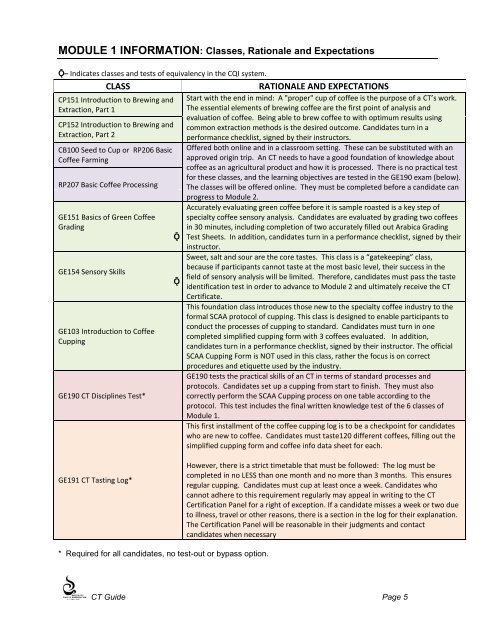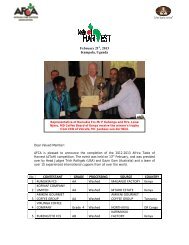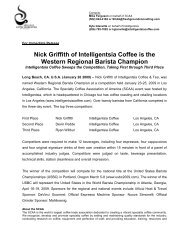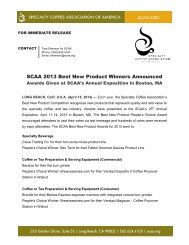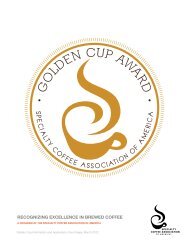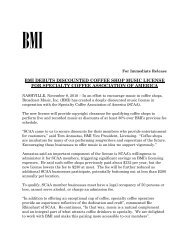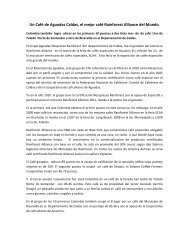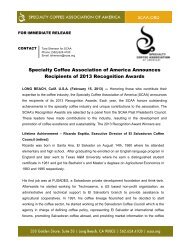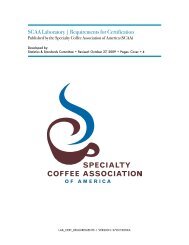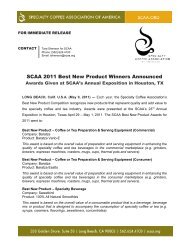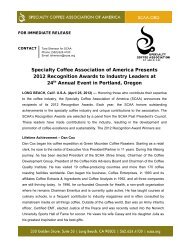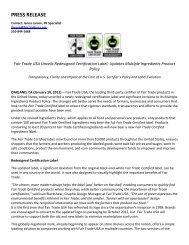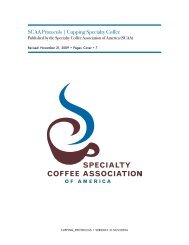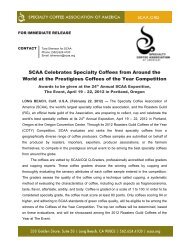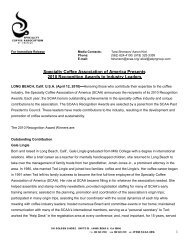Coffee Taster Certificate Program Handbook - SCAA
Coffee Taster Certificate Program Handbook - SCAA
Coffee Taster Certificate Program Handbook - SCAA
Create successful ePaper yourself
Turn your PDF publications into a flip-book with our unique Google optimized e-Paper software.
MODULE 1 INFORMATION: Classes, Rationale and Expectations<br />
Ǭ– Indicates classes and tests of equivalency in the CQI system.<br />
CLASS<br />
CP151 Introduction to Brewing and<br />
Extraction, Part 1<br />
CP152 Introduction to Brewing and<br />
Extraction, Part 2<br />
CB100 Seed to Cup or RP206 Basic<br />
<strong>Coffee</strong> Farming<br />
RP207 Basic <strong>Coffee</strong> Processing<br />
GE151 Basics of Green <strong>Coffee</strong><br />
Grading<br />
GE154 Sensory Skills<br />
GE103 Introduction to <strong>Coffee</strong><br />
Cupping<br />
GE190 CT Disciplines Test*<br />
Ǭ<br />
Ǭ<br />
RATIONALE AND EXPECTATIONS<br />
Start with the end in mind: A "proper" cup of coffee is the purpose of a CT’s work.<br />
The essential elements of brewing coffee are the first point of analysis and<br />
evaluation of coffee. Being able to brew coffee to with optimum results using<br />
common extraction methods is the desired outcome. Candidates turn in a<br />
performance checklist, signed by their instructors.<br />
Offered both online and in a classroom setting. These can be substituted with an<br />
approved origin trip. An CT needs to have a good foundation of knowledge about<br />
coffee as an agricultural product and how it is processed. There is no practical test<br />
for these classes, and the learning objectives are tested in the GE190 exam (below).<br />
The classes will be offered online. They must be completed before a candidate can<br />
progress to Module 2.<br />
Accurately evaluating green coffee before it is sample roasted is a key step of<br />
specialty coffee sensory analysis. Candidates are evaluated by grading two coffees<br />
in 30 minutes, including completion of two accurately filled out Arabica Grading<br />
Test Sheets. In addition, candidates turn in a performance checklist, signed by their<br />
instructor.<br />
Sweet, salt and sour are the core tastes. This class is a “gatekeeping” class,<br />
because if participants cannot taste at the most basic level, their success in the<br />
field of sensory analysis will be limited. Therefore, candidates must pass the taste<br />
identification test in order to advance to Module 2 and ultimately receive the CT<br />
<strong>Certificate</strong>.<br />
This foundation class introduces those new to the specialty coffee industry to the<br />
formal <strong>SCAA</strong> protocol of cupping. This class is designed to enable participants to<br />
conduct the processes of cupping to standard. Candidates must turn in one<br />
completed simplified cupping form with 3 coffees evaluated. In addition,<br />
candidates turn in a performance checklist, signed by their instructor. The official<br />
<strong>SCAA</strong> Cupping Form is NOT used in this class, rather the focus is on correct<br />
procedures and etiquette used by the industry.<br />
GE190 tests the practical skills of an CT in terms of standard processes and<br />
protocols. Candidates set up a cupping from start to finish. They must also<br />
correctly perform the <strong>SCAA</strong> Cupping process on one table according to the<br />
protocol. This test includes the final written knowledge test of the 6 classes of<br />
Module 1.<br />
This first installment of the coffee cupping log is to be a checkpoint for candidates<br />
who are new to coffee. Candidates must taste120 different coffees, filling out the<br />
simplified cupping form and coffee info data sheet for each.<br />
GE191 CT Tasting Log*<br />
However, there is a strict timetable that must be followed: The log must be<br />
completed in no LESS than one month and no more than 3 months. This ensures<br />
regular cupping. Candidates must cup at least once a week. Candidates who<br />
cannot adhere to this requirement regularly may appeal in writing to the CT<br />
Certification Panel for a right of exception. If a candidate misses a week or two due<br />
to illness, travel or other reasons, there is a section in the log for their explanation.<br />
The Certification Panel will be reasonable in their judgments and contact<br />
candidates when necessary<br />
* Required for all candidates, no test-out or bypass option.<br />
CT Guide Page 5


